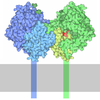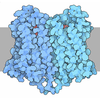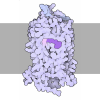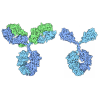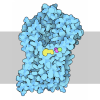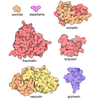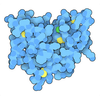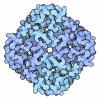[English] 日本語
 Yorodumi
Yorodumi- PDB-7x2d: Cryo-EM structure of the tavapadon-bound D1 dopamine receptor and... -
+ Open data
Open data
- Basic information
Basic information
| Entry | Database: PDB / ID: 7x2d | ||||||
|---|---|---|---|---|---|---|---|
| Title | Cryo-EM structure of the tavapadon-bound D1 dopamine receptor and mini-Gs complex | ||||||
 Components Components |
| ||||||
 Keywords Keywords |  MEMBRANE PROTEIN / MEMBRANE PROTEIN /  GPCR / GPCR /  dopamine receptor / mini-Gs / dopamine receptor / mini-Gs /  tavapadon tavapadon | ||||||
| Function / homology |  Function and homology information Function and homology informationdopamine neurotransmitter receptor activity, coupled via Gs / dopamine neurotransmitter receptor activity / cerebral cortex GABAergic interneuron migration /  Dopamine receptors / Dopamine receptors /  operant conditioning / operant conditioning /  dopamine binding / regulation of dopamine uptake involved in synaptic transmission / modification of postsynaptic structure / dopamine binding / regulation of dopamine uptake involved in synaptic transmission / modification of postsynaptic structure /  heterotrimeric G-protein binding / heterotrimeric G-protein binding /  sensitization ...dopamine neurotransmitter receptor activity, coupled via Gs / dopamine neurotransmitter receptor activity / cerebral cortex GABAergic interneuron migration / sensitization ...dopamine neurotransmitter receptor activity, coupled via Gs / dopamine neurotransmitter receptor activity / cerebral cortex GABAergic interneuron migration /  Dopamine receptors / Dopamine receptors /  operant conditioning / operant conditioning /  dopamine binding / regulation of dopamine uptake involved in synaptic transmission / modification of postsynaptic structure / dopamine binding / regulation of dopamine uptake involved in synaptic transmission / modification of postsynaptic structure /  heterotrimeric G-protein binding / heterotrimeric G-protein binding /  sensitization / regulation of dopamine metabolic process / dopamine transport / sensitization / regulation of dopamine metabolic process / dopamine transport /  peristalsis / phospholipase C-activating dopamine receptor signaling pathway / G protein-coupled receptor complex / grooming behavior / positive regulation of neuron migration / peristalsis / phospholipase C-activating dopamine receptor signaling pathway / G protein-coupled receptor complex / grooming behavior / positive regulation of neuron migration /  habituation / astrocyte development / habituation / astrocyte development /  conditioned taste aversion / positive regulation of potassium ion transport / striatum development / conditioned taste aversion / positive regulation of potassium ion transport / striatum development /  maternal behavior / dentate gyrus development / non-motile cilium / arrestin family protein binding / adult walking behavior / mating behavior / long-term synaptic depression / ciliary membrane / dopamine receptor signaling pathway / maternal behavior / dentate gyrus development / non-motile cilium / arrestin family protein binding / adult walking behavior / mating behavior / long-term synaptic depression / ciliary membrane / dopamine receptor signaling pathway /  temperature homeostasis / dopamine metabolic process / glucose import / transmission of nerve impulse / behavioral response to cocaine / G protein-coupled receptor signaling pathway, coupled to cyclic nucleotide second messenger / neuronal action potential / G-protein alpha-subunit binding / GABA-ergic synapse / behavioral fear response / temperature homeostasis / dopamine metabolic process / glucose import / transmission of nerve impulse / behavioral response to cocaine / G protein-coupled receptor signaling pathway, coupled to cyclic nucleotide second messenger / neuronal action potential / G-protein alpha-subunit binding / GABA-ergic synapse / behavioral fear response /  prepulse inhibition / adenylate cyclase-activating adrenergic receptor signaling pathway / prepulse inhibition / adenylate cyclase-activating adrenergic receptor signaling pathway /  synapse assembly / response to amphetamine / activation of adenylate cyclase activity / presynaptic modulation of chemical synaptic transmission / positive regulation of synaptic transmission, glutamatergic / positive regulation of release of sequestered calcium ion into cytosol / synapse assembly / response to amphetamine / activation of adenylate cyclase activity / presynaptic modulation of chemical synaptic transmission / positive regulation of synaptic transmission, glutamatergic / positive regulation of release of sequestered calcium ion into cytosol /  synaptic transmission, glutamatergic / long-term synaptic potentiation / G protein-coupled receptor activity / synaptic transmission, glutamatergic / long-term synaptic potentiation / G protein-coupled receptor activity /  regulation of protein phosphorylation / Olfactory Signaling Pathway / Activation of the phototransduction cascade / regulation of protein phosphorylation / Olfactory Signaling Pathway / Activation of the phototransduction cascade /  visual learning / G beta:gamma signalling through PLC beta / Presynaptic function of Kainate receptors / Thromboxane signalling through TP receptor / G-protein activation / G protein-coupled acetylcholine receptor signaling pathway / Activation of G protein gated Potassium channels / Inhibition of voltage gated Ca2+ channels via Gbeta/gamma subunits / visual learning / G beta:gamma signalling through PLC beta / Presynaptic function of Kainate receptors / Thromboxane signalling through TP receptor / G-protein activation / G protein-coupled acetylcholine receptor signaling pathway / Activation of G protein gated Potassium channels / Inhibition of voltage gated Ca2+ channels via Gbeta/gamma subunits /  cilium / adenylate cyclase-activating G protein-coupled receptor signaling pathway / Prostacyclin signalling through prostacyclin receptor / Glucagon signaling in metabolic regulation / G beta:gamma signalling through CDC42 / ADP signalling through P2Y purinoceptor 12 / G beta:gamma signalling through BTK / Synthesis, secretion, and inactivation of Glucagon-like Peptide-1 (GLP-1) / cilium / adenylate cyclase-activating G protein-coupled receptor signaling pathway / Prostacyclin signalling through prostacyclin receptor / Glucagon signaling in metabolic regulation / G beta:gamma signalling through CDC42 / ADP signalling through P2Y purinoceptor 12 / G beta:gamma signalling through BTK / Synthesis, secretion, and inactivation of Glucagon-like Peptide-1 (GLP-1) /  memory / Sensory perception of sweet, bitter, and umami (glutamate) taste / photoreceptor disc membrane / Adrenaline,noradrenaline inhibits insulin secretion / Glucagon-type ligand receptors / Vasopressin regulates renal water homeostasis via Aquaporins / G alpha (z) signalling events / cellular response to catecholamine stimulus / Glucagon-like Peptide-1 (GLP1) regulates insulin secretion / ADORA2B mediated anti-inflammatory cytokines production / ADP signalling through P2Y purinoceptor 1 / adenylate cyclase-activating dopamine receptor signaling pathway / G beta:gamma signalling through PI3Kgamma / protein import into nucleus / cellular response to prostaglandin E stimulus / memory / Sensory perception of sweet, bitter, and umami (glutamate) taste / photoreceptor disc membrane / Adrenaline,noradrenaline inhibits insulin secretion / Glucagon-type ligand receptors / Vasopressin regulates renal water homeostasis via Aquaporins / G alpha (z) signalling events / cellular response to catecholamine stimulus / Glucagon-like Peptide-1 (GLP1) regulates insulin secretion / ADORA2B mediated anti-inflammatory cytokines production / ADP signalling through P2Y purinoceptor 1 / adenylate cyclase-activating dopamine receptor signaling pathway / G beta:gamma signalling through PI3Kgamma / protein import into nucleus / cellular response to prostaglandin E stimulus /  vasodilation / Cooperation of PDCL (PhLP1) and TRiC/CCT in G-protein beta folding / sensory perception of taste / GPER1 signaling / G-protein beta-subunit binding / Inactivation, recovery and regulation of the phototransduction cascade / vasodilation / Cooperation of PDCL (PhLP1) and TRiC/CCT in G-protein beta folding / sensory perception of taste / GPER1 signaling / G-protein beta-subunit binding / Inactivation, recovery and regulation of the phototransduction cascade /  heterotrimeric G-protein complex / G alpha (12/13) signalling events / heterotrimeric G-protein complex / G alpha (12/13) signalling events /  extracellular vesicle / signaling receptor complex adaptor activity / Thrombin signalling through proteinase activated receptors (PARs) / retina development in camera-type eye / extracellular vesicle / signaling receptor complex adaptor activity / Thrombin signalling through proteinase activated receptors (PARs) / retina development in camera-type eye /  GTPase binding / GTPase binding /  presynaptic membrane presynaptic membraneSimilarity search - Function | ||||||
| Biological species |   Homo sapiens (human) Homo sapiens (human)synthetic construct (others) | ||||||
| Method |  ELECTRON MICROSCOPY / ELECTRON MICROSCOPY /  single particle reconstruction / single particle reconstruction /  cryo EM / Resolution: 3.3 Å cryo EM / Resolution: 3.3 Å | ||||||
 Authors Authors | Teng, X. / Zheng, S. | ||||||
| Funding support |  China, 1items China, 1items
| ||||||
 Citation Citation |  Journal: Nat Commun / Year: 2022 Journal: Nat Commun / Year: 2022Title: Ligand recognition and biased agonism of the D1 dopamine receptor. Authors: Xiao Teng / Sijia Chen / Yingying Nie / Peng Xiao / Xiao Yu / Zhenhua Shao / Sanduo Zheng /  Abstract: Dopamine receptors are widely distributed in the central nervous system and are important therapeutic targets for treatment of various psychiatric and neurological diseases. Here, we report three ...Dopamine receptors are widely distributed in the central nervous system and are important therapeutic targets for treatment of various psychiatric and neurological diseases. Here, we report three cryo-electron microscopy structures of the D1 dopamine receptor (D1R)-Gs complex bound to two agonists, fenoldopam and tavapadon, and a positive allosteric modulator LY3154207. The structure reveals unusual binding of two fenoldopam molecules, one to the orthosteric binding pocket (OBP) and the other to the extended binding pocket (EBP). In contrast, one elongated tavapadon molecule binds to D1R, extending from OBP to EBP. Moreover, LY3154207 stabilizes the second intracellular loop of D1R in an alpha helical conformation to efficiently engage the G protein. Through a combination of biochemical, biophysical and cellular assays, we further show that the broad conformation stabilized by two fenoldopam molecules and interaction between TM5 and the agonist are important for biased signaling of D1R. | ||||||
| History |
|
- Structure visualization
Structure visualization
| Structure viewer | Molecule:  Molmil Molmil Jmol/JSmol Jmol/JSmol |
|---|
- Downloads & links
Downloads & links
- Download
Download
| PDBx/mmCIF format |  7x2d.cif.gz 7x2d.cif.gz | 223.3 KB | Display |  PDBx/mmCIF format PDBx/mmCIF format |
|---|---|---|---|---|
| PDB format |  pdb7x2d.ent.gz pdb7x2d.ent.gz | 170.9 KB | Display |  PDB format PDB format |
| PDBx/mmJSON format |  7x2d.json.gz 7x2d.json.gz | Tree view |  PDBx/mmJSON format PDBx/mmJSON format | |
| Others |  Other downloads Other downloads |
-Validation report
| Arichive directory |  https://data.pdbj.org/pub/pdb/validation_reports/x2/7x2d https://data.pdbj.org/pub/pdb/validation_reports/x2/7x2d ftp://data.pdbj.org/pub/pdb/validation_reports/x2/7x2d ftp://data.pdbj.org/pub/pdb/validation_reports/x2/7x2d | HTTPS FTP |
|---|
-Related structure data
| Related structure data |  32965MC  7x2cC 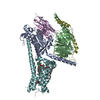 7x2fC M: map data used to model this data C: citing same article ( |
|---|---|
| Similar structure data | Similarity search - Function & homology  F&H Search F&H Search |
- Links
Links
- Assembly
Assembly
| Deposited unit | 
|
|---|---|
| 1 |
|
- Components
Components
-Protein , 2 types, 2 molecules FE
| #1: Protein | Mass: 52409.656 Da / Num. of mol.: 1 Source method: isolated from a genetically manipulated source Source: (gene. exp.)   Homo sapiens (human) / Gene: DRD1 / Production host: Homo sapiens (human) / Gene: DRD1 / Production host:   Homo sapiens (human) / References: UniProt: P21728 Homo sapiens (human) / References: UniProt: P21728 |
|---|---|
| #5: Protein | Mass: 17352.498 Da / Num. of mol.: 1 / Source method: obtained synthetically / Source: (synth.) synthetic construct (others) |
-Guanine nucleotide-binding protein ... , 3 types, 3 molecules ABD
| #2: Protein | Mass: 28907.684 Da / Num. of mol.: 1 Source method: isolated from a genetically manipulated source Source: (gene. exp.)   Homo sapiens (human) / Gene: GNAS / Production host: Homo sapiens (human) / Gene: GNAS / Production host:   Homo sapiens (human) Homo sapiens (human) |
|---|---|
| #3: Protein | Mass: 39418.086 Da / Num. of mol.: 1 Source method: isolated from a genetically manipulated source Source: (gene. exp.)   Homo sapiens (human) / Gene: GNB1 / Production host: Homo sapiens (human) / Gene: GNB1 / Production host:   Trichoplusia ni (cabbage looper) / References: UniProt: P62873 Trichoplusia ni (cabbage looper) / References: UniProt: P62873 |
| #4: Protein | Mass: 7845.078 Da / Num. of mol.: 1 / Mutation: C68S Source method: isolated from a genetically manipulated source Source: (gene. exp.)   Homo sapiens (human) / Gene: GNG2 / Production host: Homo sapiens (human) / Gene: GNG2 / Production host:   Trichoplusia ni (cabbage looper) / References: UniProt: P59768 Trichoplusia ni (cabbage looper) / References: UniProt: P59768 |
-Non-polymers , 2 types, 2 molecules 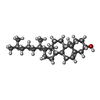
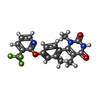

| #6: Chemical | ChemComp-CLR /  Cholesterol Cholesterol |
|---|---|
| #7: Chemical | ChemComp-86W /  Tavapadon Tavapadon |
-Details
| Has ligand of interest | Y |
|---|
-Experimental details
-Experiment
| Experiment | Method:  ELECTRON MICROSCOPY ELECTRON MICROSCOPY |
|---|---|
| EM experiment | Aggregation state: PARTICLE / 3D reconstruction method:  single particle reconstruction single particle reconstruction |
- Sample preparation
Sample preparation
| Component |
| ||||||||||||||||||||||||
|---|---|---|---|---|---|---|---|---|---|---|---|---|---|---|---|---|---|---|---|---|---|---|---|---|---|
| Source (natural) | Organism:   Homo sapiens (human) Homo sapiens (human) | ||||||||||||||||||||||||
| Source (recombinant) | Organism:   Homo sapiens (human) Homo sapiens (human) | ||||||||||||||||||||||||
| Buffer solution | pH: 7.5 | ||||||||||||||||||||||||
| Specimen | Conc.: 4 mg/ml / Embedding applied: NO / Shadowing applied: NO / Staining applied : NO / Vitrification applied : NO / Vitrification applied : YES : YES | ||||||||||||||||||||||||
| Specimen support | Grid material: GOLD / Grid mesh size: 300 divisions/in. / Grid type: Quantifoil R1.2/1.3 | ||||||||||||||||||||||||
Vitrification | Instrument: FEI VITROBOT MARK IV / Cryogen name: ETHANE / Humidity: 100 % / Chamber temperature: 281 K |
- Electron microscopy imaging
Electron microscopy imaging
| Experimental equipment |  Model: Titan Krios / Image courtesy: FEI Company |
|---|---|
| Microscopy | Model: FEI TITAN KRIOS |
| Electron gun | Electron source : :  FIELD EMISSION GUN / Accelerating voltage: 300 kV / Illumination mode: FLOOD BEAM FIELD EMISSION GUN / Accelerating voltage: 300 kV / Illumination mode: FLOOD BEAM |
| Electron lens | Mode: BRIGHT FIELD Bright-field microscopy / Nominal magnification: 64000 X / Nominal defocus max: 2000 nm / Nominal defocus min: 700 nm Bright-field microscopy / Nominal magnification: 64000 X / Nominal defocus max: 2000 nm / Nominal defocus min: 700 nm |
| Specimen holder | Cryogen: NITROGEN |
| Image recording | Electron dose: 50 e/Å2 / Film or detector model: GATAN K3 BIOQUANTUM (6k x 4k) / Num. of real images: 1861 |
- Processing
Processing
| Software | Name: PHENIX / Version: 1.19.2_4158: / Classification: refinement | ||||||||||||||||||||||||
|---|---|---|---|---|---|---|---|---|---|---|---|---|---|---|---|---|---|---|---|---|---|---|---|---|---|
| EM software |
| ||||||||||||||||||||||||
CTF correction | Type: PHASE FLIPPING AND AMPLITUDE CORRECTION | ||||||||||||||||||||||||
| Particle selection | Num. of particles selected: 1964454 | ||||||||||||||||||||||||
3D reconstruction | Resolution: 3.3 Å / Resolution method: FSC 0.143 CUT-OFF / Num. of particles: 399390 / Num. of class averages: 1 / Symmetry type: POINT | ||||||||||||||||||||||||
| Refine LS restraints |
|
 Movie
Movie Controller
Controller


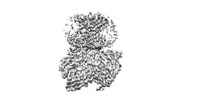

 PDBj
PDBj